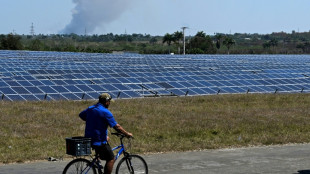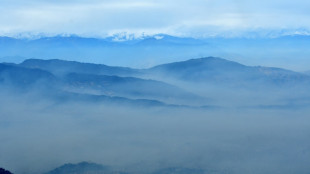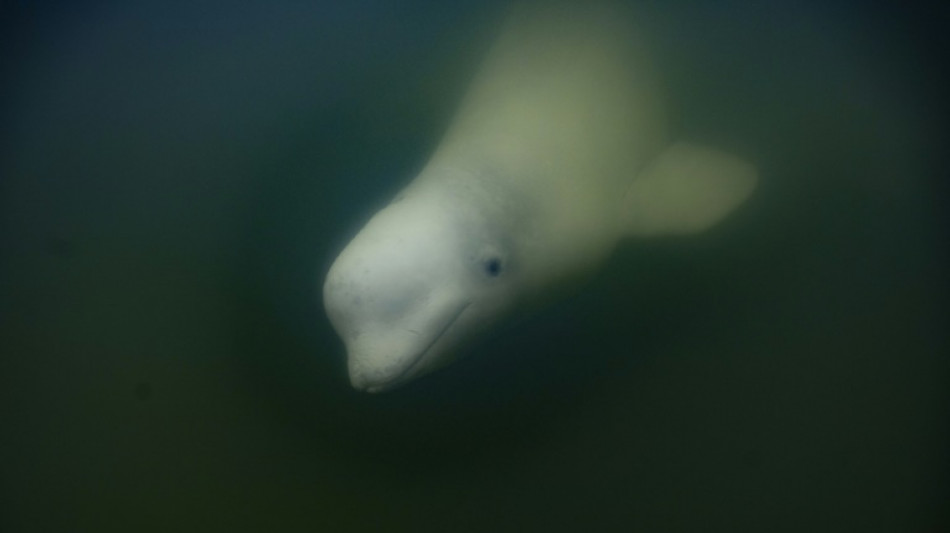
-
 De Bruyne to leave Man City at end of the season
De Bruyne to leave Man City at end of the season
-
Youthful Matildas provide spark in friendly win over South Korea

-
 Stocks, oil extend rout as China retaliates over Trump tariffs
Stocks, oil extend rout as China retaliates over Trump tariffs
-
De Bruyne says he will leave Man City at end of season

-
 UK spy agency MI5 reveals fruity secrets in new show
UK spy agency MI5 reveals fruity secrets in new show
-
Leverkusen's Wirtz to return 'next week', says Alonso

-
 England bowler Stone to miss most of India Test series
England bowler Stone to miss most of India Test series
-
Taiwan earmarks $2.7 bn to help industries hit by US tariffs

-
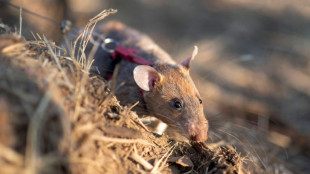 Rat earns world record for sniffing landmines in Cambodia
Rat earns world record for sniffing landmines in Cambodia
-
Elton John says new album 'freshest' since 1970s

-
 EU announces 'new era' in relations with Central Asia
EU announces 'new era' in relations with Central Asia
-
Greece nixes Acropolis shoot for 'Poor Things' director

-
 'Historic moment': South Koreans react to Yoon's dismissal
'Historic moment': South Koreans react to Yoon's dismissal
-
Israel kills Hamas commander in Lebanon strike

-
 Trump unveils first $5 million 'gold card' visa
Trump unveils first $5 million 'gold card' visa
-
Crashes, fires as Piastri fastest in chaotic second Japan GP practice

-
 India and Bangladesh leaders meet for first time since revolution
India and Bangladesh leaders meet for first time since revolution
-
Israel expands ground offensive in Gaza

-
 Families of Duterte drug war victims demand probe into online threats
Families of Duterte drug war victims demand probe into online threats
-
Stocks extend global rout after Trump's shock tariff blitz

-
 Kolkata's Iyer more bothered about impact than price tag
Kolkata's Iyer more bothered about impact than price tag
-
BP chairman to step down after energy strategy reset

-
 Indian patriotic movie 'icon' Manoj Kumar dies aged 87
Indian patriotic movie 'icon' Manoj Kumar dies aged 87
-
China floats battle barges in Taiwan invasion plans
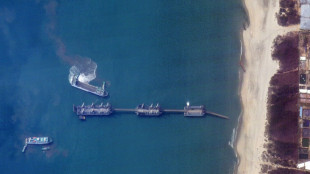
-
 McLaren's Piastri fastest in chaotic second Japanese GP practice
McLaren's Piastri fastest in chaotic second Japanese GP practice
-
South Korea seize two tons of cocaine in largest-ever drug bust

-
 Pacific nations perplexed, worried by Trump tariffs
Pacific nations perplexed, worried by Trump tariffs
-
The race to save the Amazon's bushy-bearded monkeys
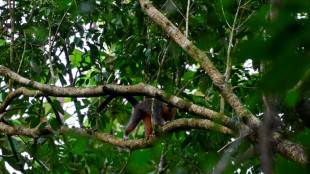
-
 TikTok must find non-Chinese owner by Saturday to avert US ban
TikTok must find non-Chinese owner by Saturday to avert US ban
-
Trump tariffs to test resiliency of US consumers

-
 Clamping down on 'forever chemicals'
Clamping down on 'forever chemicals'
-
Prominent US academic facing royal insult charge in Thailand

-
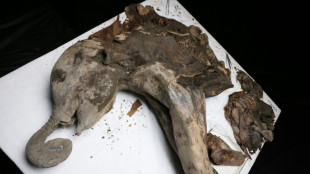 Yana, a 130,000-year-old baby mammoth, goes under the scalpel
Yana, a 130,000-year-old baby mammoth, goes under the scalpel
-
'Don't want to die': Lesotho HIV patients look to traditional medicine

-
 Curry scores 37 as Warriors outgun LeBron's Lakers
Curry scores 37 as Warriors outgun LeBron's Lakers
-
Crops under threat as surprise March heatwave hits Central Asia: study
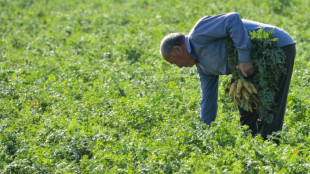
-
 Japan PM says Trump tariffs a 'national crisis'
Japan PM says Trump tariffs a 'national crisis'
-
Security 'breakdown' allows armed men into Melbourne's MCG

-
 Norris fastest in Japan GP first practice, Tsunoda sixth on Red Bull debut
Norris fastest in Japan GP first practice, Tsunoda sixth on Red Bull debut
-
Albon says Thailand taking bid for F1 race 'very seriously'

-
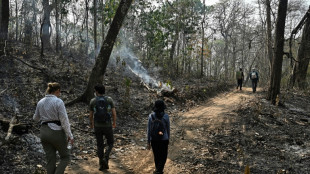 'It's gone': conservation science in Thailand's burning forest
'It's gone': conservation science in Thailand's burning forest
-
Protest as quake-hit Myanmar junta chief joins Bangkok summit

-
 EU leaders push for influence at Central Asia summit
EU leaders push for influence at Central Asia summit
-
Asian stocks extend global rout after Trump's shock tariff blitz

-
 Lewandowski, Mbappe duel fuelling tight La Liga title race
Lewandowski, Mbappe duel fuelling tight La Liga title race
-
South Korea court upholds President Yoon's impeachment, strips him of office

-
 Liverpool march towards title as Man City face Man Utd
Liverpool march towards title as Man City face Man Utd
-
Finland's colossal bomb shelters a model for jittery Europe
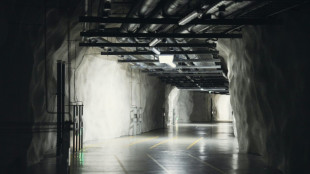
-
 Athletes frustrated as France mulls Muslim headscarf ban in sport
Athletes frustrated as France mulls Muslim headscarf ban in sport
-
Korda downs Kupcho to stay alive at LPGA Match Play


Canada's Hudson Bay a summer refuge for thousands of belugas
Half a dozen beluga whales dive and reemerge around tourist paddle boards in Canada's Hudson Bay, a handful of about 55,000 of the creatures that migrate from the Arctic to the bay's more temperate waters each summer.
Far from the Seine river where a beluga strayed in early August north of Paris, the estuaries that flow into the bay in northern Canada offer a sanctuary for the small white whales to give birth in relative warm and shelter.
In the murky bay, the belugas, with small dark eyes and what look like wide smiles, seem to enjoy the presence of a cluster of tourists who travelled to the remote town of Churchill -- home to some 800 people and only accessible by train or plane -- to observe the cetaceans.
For more than seven months of the year, between November and June, the bay is frozen.
The thaw marks the return of the belugas to the haven, where they are protected from orcas and feed on the rich food found in the estuaries.
The gray color of the young whales stands out against the bright white adults as they glide through the water in packs, all the while communicating in their own array of sounds.
- Hydrophone -
Nicknamed "canaries of the sea" due to the 50 or so different vocalizations -- whistles, clicks, chirps and squeals -- they emit, belugas are "social butterflies" and "sound is the glue of that society," said Valeria Vergara, who has been studying them for years.
"Belugas are sound-centered species, and sound to them is really like vision to us," the researcher with the Raincoast Conservation Foundation told AFP.
Listening at the speaker of a hydrophone, the 53-year-old scientist tries to distinguish the multitude of sounds from the depths -- a cacophony to the untrained ear.
"They need to rely on sound to communicate and they also rely on sound to echolocate, to find their way... to find food," said Vergara, who has identified "contact calls" used between members of a pod.
Newborn belugas, which measure around 1.8 meters (six feet) long and weigh some 80 kilos (175 pounds), remain dependent on their mother for two years.
As an adult, the mammal -- which generally matures in the icy waters around Greenland and in the north of Canada, Norway and Russia -- can grow to six meters long and live between 40 and 60 years.
The Hudson Bay beluga population is the largest in the world.
But the decrease in ice due to climate change, in an area that is warming three to four times faster than the rest of the planet, is a cause for concern for researchers.
L.Durand--AMWN
